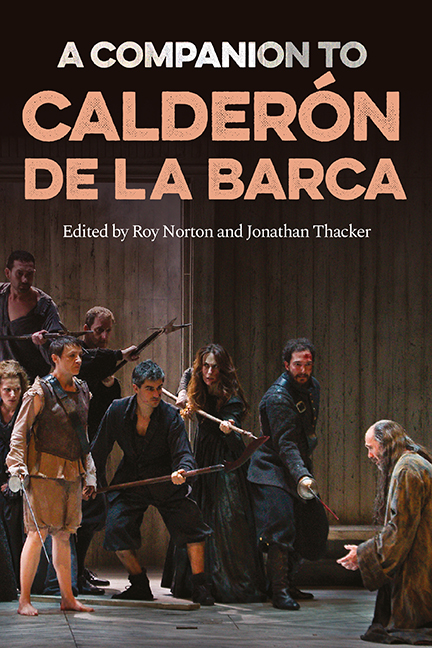Book contents
- Frontmatter
- Dedication
- Contents
- List of Illustrations
- List of Contributors
- Acknowledgements
- List of Abbreviations
- Introduction
- 1 Biography and Context
- 2 The Calderonian World
- 3 The Playwright’s Craft: Calderón and the Great Theatrical World of Early Modern Spain
- 4 La vida es sueño
- 5 The Honour Plays of Calderón
- 6 Calderón, the Comedian
- 7 Mythological Court Spectacle Plays
- 8 Religious comedias
- 9 Calderón’s ‘Sacramental, Allegorical and Historical’ autos
- 10 Calderón’s graciosos
- 11 Calderón and Visual Art
- 12 The Staging of Calderón’s Theatre
- 13 Calderón’s European Reception from Romanticism to the Twentieth Century
- 14 The Reception of Calderón in the Hispanic World
- Appendices
- Consolidated Bibliography
- Index
- Tamesis • Companions
14 - The Reception of Calderón in the Hispanic World
Published online by Cambridge University Press: 07 October 2022
- Frontmatter
- Dedication
- Contents
- List of Illustrations
- List of Contributors
- Acknowledgements
- List of Abbreviations
- Introduction
- 1 Biography and Context
- 2 The Calderonian World
- 3 The Playwright’s Craft: Calderón and the Great Theatrical World of Early Modern Spain
- 4 La vida es sueño
- 5 The Honour Plays of Calderón
- 6 Calderón, the Comedian
- 7 Mythological Court Spectacle Plays
- 8 Religious comedias
- 9 Calderón’s ‘Sacramental, Allegorical and Historical’ autos
- 10 Calderón’s graciosos
- 11 Calderón and Visual Art
- 12 The Staging of Calderón’s Theatre
- 13 Calderón’s European Reception from Romanticism to the Twentieth Century
- 14 The Reception of Calderón in the Hispanic World
- Appendices
- Consolidated Bibliography
- Index
- Tamesis • Companions
Summary
A UNIVERSAL CLASSIC? EL ALCALDE DE ZALAMEA ON THE CONTEMPORARY STAGE AND SCREEN
La vida es sueño [Life is a Dream] is the most regularly staged comedia in the UK, a symptom and cause of the play sometimes referred to as the Spanish Hamlet being amongst the very few examples of Golden Age theatre to have entered the global dramatic canon. El alcalde de Zalamea [The Mayor of Zalamea], ‘a play which audiences, readers and critics alike have found easy to respond to and appreciate’ nevertheless has an equal or greater claim to being Calderón de la Barca's best-loved title back home. Extant fragments of an early silent film adaptation are held in the Spanish Film Institute, and two subsequent feature-length versions made after the introduction of sound to cinema – El alcalde de Zalamea (José Gutiérrez Maesso, 1954) and La leyenda del alcalde de Zalamea [The Legend of the Mayor of Zalamea] (Mario Camus, 1973) – collectively ensure that it has been the comedia most often adapted for the screen. Since its creation in 1986, the Compañía Nacional de Teatro Clásico [National Classical Theatre Company] (CNTC) has staged four productions, more than of any other play. In a very different theatrical realm, from 1994 onwards, the real-life villagers of the town of Zalamea have performed an amateur version every August, an event declared in 2018 to be of national tourist interest. The primary aim of this chapter is to understand better how and why El alcalde retains its appeal for modern-day audiences, and to consider some of the ways in which contemporary performances might influence our reading of the play-text.
The narrative addresses the complex interplay between duty, honour and interpersonal relations amidst the disruptive presence of soldiers billeted in the eponymous small rural town. Captain Álvaro is lodged in the home Pedro Crespo shares with his two children – Isabel and Juan – alongside their cousin Inés. Concerned for his daughter, the paterfamilias conceals her existence from the outsider. Álvaro uncovers the ruse and, fulfilling Crespo's worst fears, rapes the young woman. Isabel's father begs the captain to restore their honour by becoming her husband.
- Type
- Chapter
- Information
- A Companion to Calderón de la Barca , pp. 300 - 318Publisher: Boydell & BrewerPrint publication year: 2021



